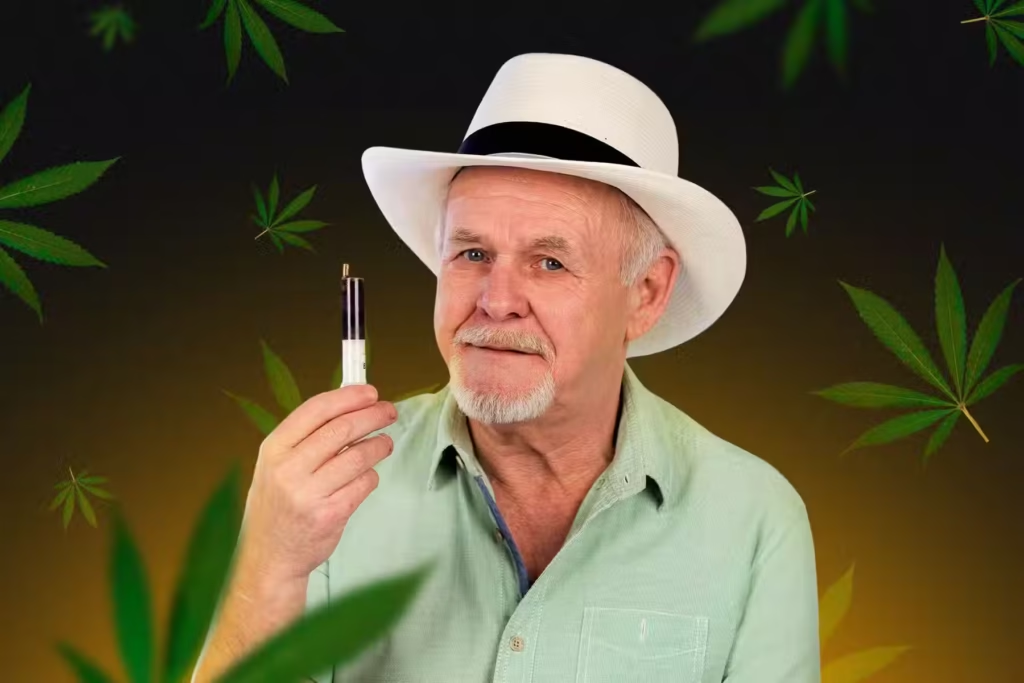No products in the cart.
Blog
History of Rick Simpson Oil: Who Is Rick Simpson?
Rick Simpson Oil (RSO) ranks among the most talked-about cannabis extracts in alternative medicine today. To truly understand its therapeutic potential, we must explore the history of Rick Simpson Oil—how Rick Simpson discovered it, why it gained global attention, and how the man behind the movement became a cannabis icon. Rick Simpson’s journey, which began with a workplace injury, led him to create a homemade remedy that evolved into a global phenomenon. Many people seeking natural alternatives for chronic illnesses, including cancer, now consider RSO a hopeful option.
What Is Rick Simpson Oil (RSO)?
Rick Simpson Oil is a full-extract cannabis oil (FECO) derived from the entire cannabis plant. This oil features a thick consistency and contains a high THC concentration (typically 60–90%). Many individuals use RSO to manage chronic pain, inflammation, and cancer-related symptoms. Unlike CBD oil, RSO includes significant levels of tetrahydrocannabinol (THC), the psychoactive component in cannabis that shows potential anti-cancer and therapeutic effects in preclinical research.

How Is RSO Made?
To create RSO, producers soak cannabis plant material in a solvent like ethanol or naphtha to extract cannabinoids. Afterward, they boil the mixture to evaporate the solvent, which leaves behind a thick, dark oil. Rick Simpson encouraged people to apply the oil topically or ingest small doses over a 90-day protocol with gradually increasing quantities.
⚠️ Note: Because the process involves flammable solvents, individuals must use caution and ensure they follow proper safety protocols and comply with local laws.
Common Uses of RSO
- Managing chronic pain
- Stimulating appetite
- Reducing inflammation
- Supporting patients undergoing cancer treatment
The History of Rick Simpson Oil
The History of Rick Simpson Oil starts with Rick Simpson himself—a Canadian engineer who invented the oil after experiencing a workplace accident in 1997. While working in a hospital boiler room, Simpson inhaled toxic fumes, which caused long-term symptoms like tinnitus, dizziness, and headaches. Frustrated with conventional treatments, he began studying medical cannabis and developed his oil to manage the symptoms.
In 2003, doctors diagnosed Rick Simpson with basal cell carcinoma, a type of skin cancer. Inspired by studies showing that THC could kill cancer cells in animals, Simpson applied his cannabis oil directly to the cancerous spots on his skin. After a few days, he observed that the lesions had disappeared.
Key Milestones in the History of RSO
- 1997: Rick Simpson suffers a head injury and begins experimenting with cannabis.
- 2003: Doctors diagnose him with skin cancer; he treats it using his homemade cannabis oil.
- 2005–2009: Simpson distributes his oil to thousands of Canadian patients at no cost.
- 2009: He releases the documentary Run From the Cure, drawing international attention.
- 2013 onward: Facing legal threats in Canada, Simpson relocates to Europe.
Rick Simpson’s Mission: Free Cannabis Oil for All
Following his recovery, Simpson began producing RSO in larger quantities and distributed it for free to patients with conditions like cancer, multiple sclerosis, and chronic pain. His mission remained clear: provide cannabis oil to those in need, without financial gain.
Between 2003 and 2009, he estimates that he helped over 5,000 individuals. Canadian authorities raided his home multiple times and confiscated his cannabis plants. Although courts never sentenced him to prison, the ongoing legal pressure eventually forced him to leave Canada and move to Europe.
Legal Battles and Controversy
Despite RSO’s potential healing effects, controversy surrounds it. In many countries, laws still prohibit the production of high-THC extracts.
Legal Challenges in Canada
Law enforcement raided Rick Simpson’s home several times and seized large quantities of cannabis. Authorities fined him and issued multiple warnings under the Controlled Drugs and Substances Act, although they never imprisoned him.
Legal Status Around the World
- Canada: Cannabis became legal in 2018, yet DIY production of RSO still falls into a legal gray area.
- United States: State laws vary; federally, cannabis remains illegal.
- Europe: Countries like the Netherlands and Spain offer leniency via cannabis clubs, whereas others, like France, enforce stricter rules.
What Makes RSO Different from Other Cannabis Oils?
Several features distinguish Rick Simpson Oil from other cannabis concentrates:
- Whole-plant extraction: Producers use the entire cannabis plant to preserve the full cannabinoid and terpene profile.
- High THC content: RSO contains significantly more THC than typical cannabis or CBD oils.
- Versatile application: Users can ingest it, apply it topically, or use it as a suppository.
These characteristics make RSO appealing to people searching for strong, full-spectrum cannabis extracts.

RSO and Cancer: What the Science Says
A key reason for RSO’s popularity lies in its application as an alternative cancer treatment. Thousands of anecdotal reports claim that the oil helped reduce tumors or ease cancer symptoms. Nevertheless, clinical evidence remains limited.
Scientific Research
- Guzmán et al., 2003 (Nature Reviews Cancer): Demonstrated that THC shrank tumors in mice with glioblastoma.
- Velasco et al., 2004: Found that cannabinoids triggered apoptosis (cell death) in cancer cells.
- British Journal of Cancer, 2006: Observed anti-tumor effects of THC on breast cancer cells in vitro.
Although these findings appear promising, most remain preclinical. Scientists still need to conduct human trials to confirm their effectiveness. Patients should always consult medical professionals before adding cannabis products like RSO to their treatment plan.
Rick Simpson’s Global Impact
Rick Simpson’s message spread across the globe, especially after he released his 2008 documentary Run From the Cure. While living in exile, he continued to advocate for cannabis oil. Although now retired due to health reasons, his legacy endures through his books, interviews, and online presence.
Global Reach and Advocacy
- Online forums (e.g., Reddit’s r/RSO) provide community support.
- Patient advocacy groups cite Simpson’s work as influential.
- Guides based on his original formula have been translated worldwide.
Today, people use the term Rick Simpson Oil globally to describe homemade, high-THC cannabis extracts. Many patients rely on guides inspired by Simpson’s method to create their versions at home.
Conclusion: A Lasting Legacy in Cannabis History
The History of Rick Simpson Oil goes far beyond dates and discoveries—it tells the story of one man’s fight to bring a plant-based remedy to those in need. Whether viewed as a pioneer or a polarizing figure, Rick Simpson dramatically changed the way people perceive medical cannabis.
As laws continue evolving and scientific research grows, the future of RSO and similar therapies looks bright. Eventually, we may see comprehensive clinical trials and increased medical acceptance. Yet no matter how far the industry progresses, its roots remain grounded in Rick Simpson’s extraordinary journey—from a hospital boiler room to global cannabis hero.

